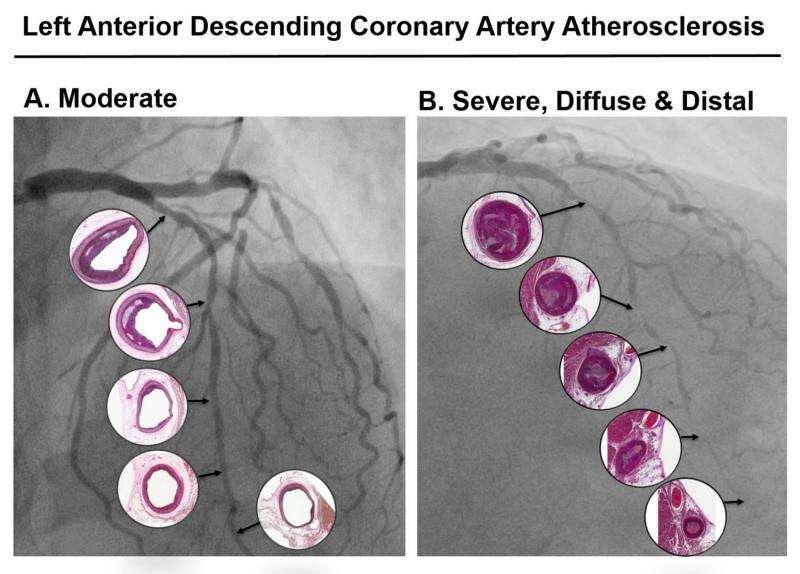Researchers find two biomarkers linked to severe heart disease

Insulin resistance affects tens of millions of Americans and is a big risk factor for heart disease. Yet, some people with the condition never develop heart disease, while some experience moderate coronary blockages. Others, though, get severe atherosclerosis - multiple blockages and deterioration of coronary arteries characterized by thick, hard, plaque-ridden arterial walls. Researchers at the UNC School of Medicine created a first-of-its-kind animal model to pinpoint two biomarkers that are elevated in the most severe form of coronary disease.
The study, published today in the journal PLoS One, suggests two new targets - oxidized LDL cholesterol and glycated proteins (i.e., fructosamine or hemoglobin A1c) - that researchers can further investigate and perhaps target through medications to help people with insulin resistance avoid the worst kind of heart disease.
"If these correlations were also found in insulin resistant humans, then we would want to do everything we could to treat them because they would be at a very high risk of developing severe cardiovascular disease," said Timothy Nichols, MD, professor of medicine and pathology and first author of the PLoS One paper.
Interestingly, Nichols and his colleagues did not set out to pinpoint the two key biomarkers. They wanted to create an insulin resistant animal model that mimicked human heart disease. They chose pigs, which are metabolically similar to humans and have hearts very much like human hearts. By feeding the animals a diet high in fat and salt over the course of a year, all the pigs became insulin resistant. That is, their bodies produced a lot of insulin but their cells did not respond to the hormone as well as normal. All the pigs also developed coronary and aortic atherosclerosis. But only about half of the pigs developed the most severe form of the disease.
When the researchers checked the pigs for high levels of insulin resistance, they found no correlation with the most severe atherosclerosis. This was a surprising and unexpected finding.
David Clemmons, MD, the Sarah Graham Kenan Professor of Medicine, professor of biochemistry and biophysics, and senior author of the PLoS One paper, knew that the scientific literature suggested a correlation between atherosclerosis and glycated proteins - proteins bonded with sugars in blood.
Clemmons and colleagues tested the pigs for high levels of fructosamine and oxidized LDL cholesterol, which are surrogates for high levels of glycated proteins. Sure enough, all the pigs with severe heart disease had elevated levels of fructosamine and oxidized LDL.
"Also, this correlation was more common in females," Clemmons said. Fourteen of the 20 pigs that developed severe atherosclerosis were females. Fourteen of the 17 pigs that did not develop severe atherosclerosis were male. "This surprised me, so I looked in the literature for anything similar."
Clemmons found a study from Finland published in 2005 showing that elevated glycated protein levels were strongly associated with advanced heart disease and increased mortality in women but not in men.
"The underlying causes of this correlation are unknown," Clemmons said. "But now we have a unique animal model that very much mimics what we see in humans. Our model is a good predictor of diet-induced atherosclerosis in females."
A next step could be to study the affected heart tissue to find abnormal biochemical reactions in the cellular pathways involved in glycated proteins and severe coronary disease. This could lead to potential new treatment approaches or tailored dietary interventions.
Clemmons added, "We could also study what's different about these female pigs that make them much more susceptible to severe heart disease, if they have higher levels of glycated proteins."
More information: dx.plos.org/10.1371/journal.pone.0132302
















